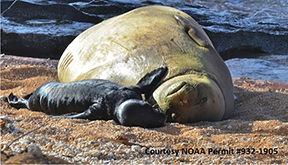LIHUE — Authorities captured a pair of free-roaming dogs last month in an area of Kauai’s North Shore where one monk seal pup was mauled to death and four other seals were bitten. While there is no conclusive evidence, an
LIHUE — Authorities captured a pair of free-roaming dogs last month in an area of Kauai’s North Shore where one monk seal pup was mauled to death and four other seals were bitten.
While there is no conclusive evidence, an official with the state Department of Land and Natural Resources suspects the dogs were involved in the attack.
Thomas Kaiakapu, Kauai wildlife manager for DLNR’s Division of Forestry and Wildlife, said a camera that had been set up in the area snapped a photograph of the dogs within hours of the incident.
“These are stray, wild dogs,” he said, adding he suspected they were lost by hunters.
Both dogs have since been euthanized.
Jamie Thomton, the Kauai marine mammal response program coordinator for the National Oceanic and Atmospheric Administration Fisheries Service, stressed that recent DNA tests were not conclusive.
“So we’re still concerned there are other dogs out there,” he said.
The two-week old seal pup, the fifth born on Kauai this season, was found dead early July 29 on a secluded North Shore beach, with deep puncture wounds to the neck. The incident occurred between 5 p.m. July 28, when a volunteer “pup sitter” went home for the evening, and 5:45 a.m. July 29, when another volunteer arrived at the remote beach between Kilauea and Moloaa.
NOAA said the pup, which was still nursing, and its mother had been enclosed in a Seal Protection Zone, a type of fencing that serves as a warning for beachgoers and keeps out dogs.
Following the incident, authorities set up additional cameras and traps in an attempt to spot and capture the dogs responsible.
The first of the two captured dogs was caught Aug. 4, and the second nearly three weeks later, on Aug. 23, according to Kaiakapu.
They were immediately turned over to NOAA and tested for canine distemper. Both came back as negative, which Thomton said is good news for Hawaii’s native monk seal population.
Distemper, which does not exist in Hawaii, is a primary concern with dog attacks. The deadly viral disease affects the respiratory, gastrointestinal and central nervous systems, and has led to significant loss of other marine mammals, including harbor seals.
Neither dog was microchipped, which would have allowed officials to track them to an owner.
Penny Cistaro, executive director of the Kauai Humane Society, said both were brought to the shelter shortly after being captured and were euthanized Aug. 28. She described them as unsocialized and skinny hound mixes.
“We held the first one so long because of the delay in the DNA, but through a discussion with Jamie (Thomton) it was determined that we did not need to hold the dogs for the results,” she wrote in an email.
The dead seal pup was the third born to RK28, or “KC,” who has given birth, in the past, on Oahu and Niihau, according to NOAA. A necropsy, conducted by NOAA Fisheries Service the day of the attack, confirmed the cause of death as trauma caused most likely by dog bite.
RK28 suffered puncture wounds to her muzzle, likely during an attempt to protect her newborn pup, the federal agency said at the time. Three others, including a second mother-pup pair and a weaned seal, also suffered puncture wounds consistent with a dog attack.
Thomton said Friday that one female pup, PK4, had “substantial” puncture wounds up and down both sides of her body, as well as her head and neck. After she developed abscesses, NOAA captured the seal to drain the wounds and treat her with antibiotics.
“Now she’s doing just fine,” Thomton said.
The others involved in the attack suffered less serious injuries and have recovered, he added.
Since capturing the two strays, Kaiakapu said that DLNR has not received additional reports of dogs in the area.
“It’s a relief because we feel that these two dogs are the ones that have been ranging that area.”
The Hawaiian monk seal is one of the rarest marine mammals in the world. The majority, about 900, reside in the Northwestern Hawaiian Islands, part of the Papahanaumokuakea Marine National Monument. A smaller but growing population of about 200 seals inhabit the main Hawaiian Islands.
NOAA says each individual seal is critical to the survival of the population.
Anyone with additional information regarding the July attack is asked to contact the NOAA Marine Mammal Hotline at (888) 256-9840.


